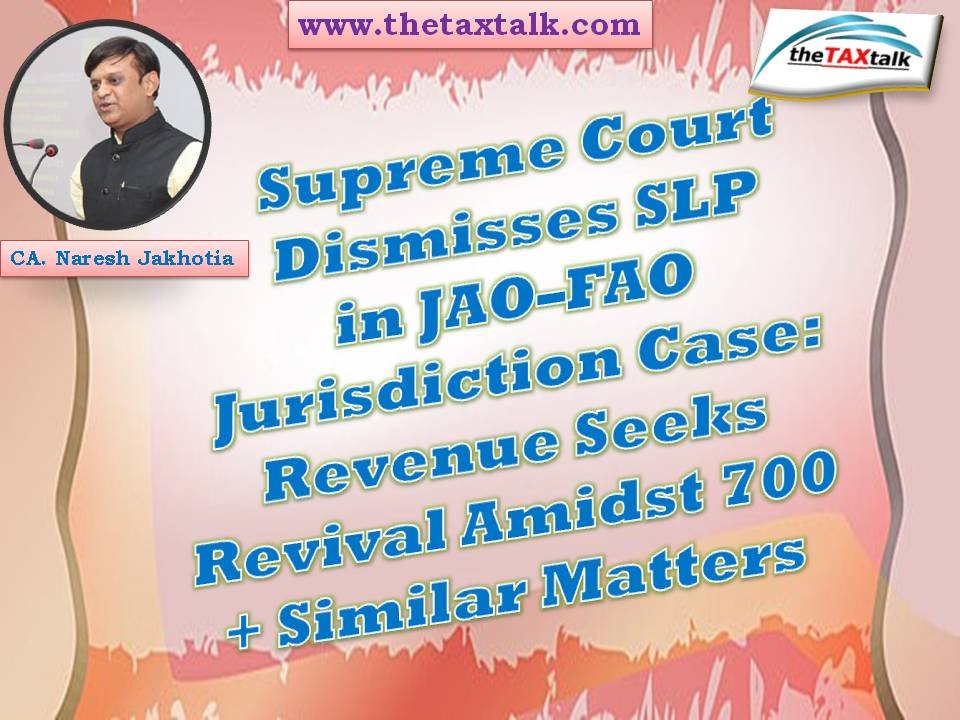![]()
Supreme Court Dismisses SLP in JAO–FAO Jurisdiction Case: Revenue Seeks Revival Amidst 700+ Similar Matters
In a key development surrounding the controversial jurisdictional divide between Jurisdictional Assessing Officers (JAOs) and Faceless Assessment Officers (FAOs), the Supreme Court recently dismissed the Revenue’s Special Leave Petition (SLP) in the case of ADIT (Int. Taxn)-2, Hyderabad & Anr. vs. Deepanjan Roy.
However, with over 700 similar cases pending before another Bench of the Apex Court, the Revenue has now filed a Miscellaneous Application (M.A.) seeking restoration of the dismissed SLP and tagging it along with the other pending matters.
The Dispute: JAO vs FAO Jurisdiction Post Finance Act, 2021
Following the introduction of the Faceless Assessment Scheme under the Finance Act, 2021, the Income Tax Department introduced a parallel regime for assessments and appeals. However, the demarcation between the traditional JAO system and the centralized FAO mechanism has been unclear in many practical scenarios.
This has triggered a wave of litigation where courts have had to decide which authority-the JAO or the FAO-has jurisdiction over reassessments, rectifications, or appeals. Notably, different High Courts have taken divergent views, creating legal uncertainty for taxpayers and tax authorities alike.
The Dismissed SLP: Deepanjan Roy Case
In SLP (Civil) Diary No. 33956/2025, arising out of WP No. 23573/2024 from the Telangana High Court, the Revenue challenged a decision that presumably favored the taxpayer regarding jurisdictional validity.
The matter was heard on 16th July 2025 by a Bench comprising Justice J.B. Pardiwala and Justice R. Mahadevan.
Key excerpts from the SC order:
“Having heard the learned counsel appearing for the petitioners – Revenue – and having gone through the materials on record, we find no good reason to interfere with the impugned order passed by the High Court. The Special Leave Petition is, accordingly, dismissed.”
While the Court condoned the delay and allowed the exemption application, it found no merit to interfere with the High Court ruling. As a result, the SLP was summarily dismissed, without a detailed adjudication on the substantive issue of jurisdiction.
Revenue’s Response: Seeks Restoration via M.A.
In light of this dismissal and the pendency of 700+ similar cases before another SC Bench, the Revenue has filed a Miscellaneous Application urging the Apex Court to:
• Restore the dismissed SLP, and
• Tag it along with the batch of pending mattersdealing with the same JAO–FAO jurisdiction controversy.
The plea emphasizes the need for consistency in legal interpretation, pointing to the divergent High Court judgments on the issue, and the operational chaos it continues to cause.
Where It Stands Now
The restoration application is currently listed before the same Bench of Justice Pardiwala and Justice Mahadevan. If accepted, the matter could be revived and consolidated with the pending batch for comprehensive adjudication.
Implications for Taxpayers and the Department
If the Apex Court ultimately decides to hear the matter on merits, it could:
• Resolve the turf warbetween JAO and FAO jurisdictions once and for all;
• Set a binding precedenton the scope of faceless assessments;
• Prevent parallel or conflicting proceedingsand reduce litigation;
• Enable smoother implementation of faceless governance reformsin tax administration.
Conclusion
While the dismissal of the SLP in the Deepanjan Roy case might appear as a minor setback for the Revenue, it has become a pivot around which a much larger constitutional and procedural debate is unfolding. The Supreme Court’s decision on the restoration plea-and eventual ruling on the merits-will have a profound impact on tax assessments, procedural law, and taxpayer rights in the post-2021 era.
The copy of the order is as under:


